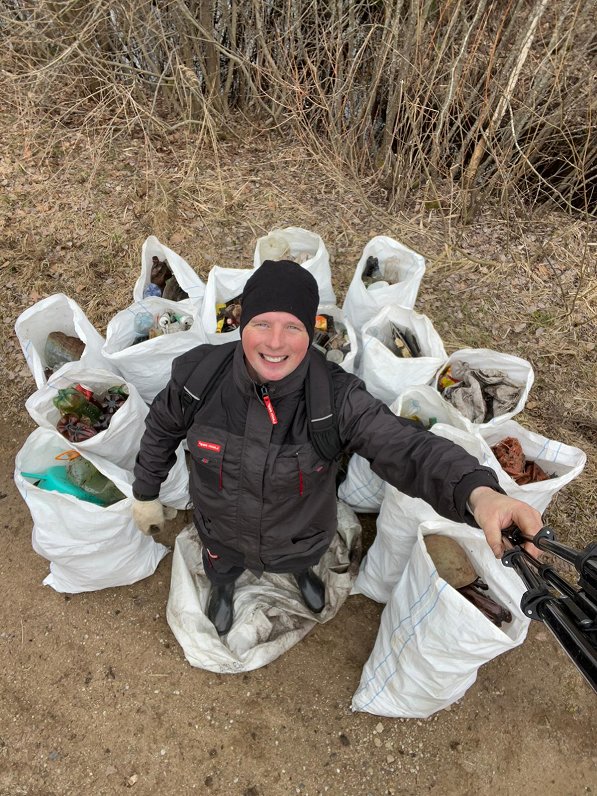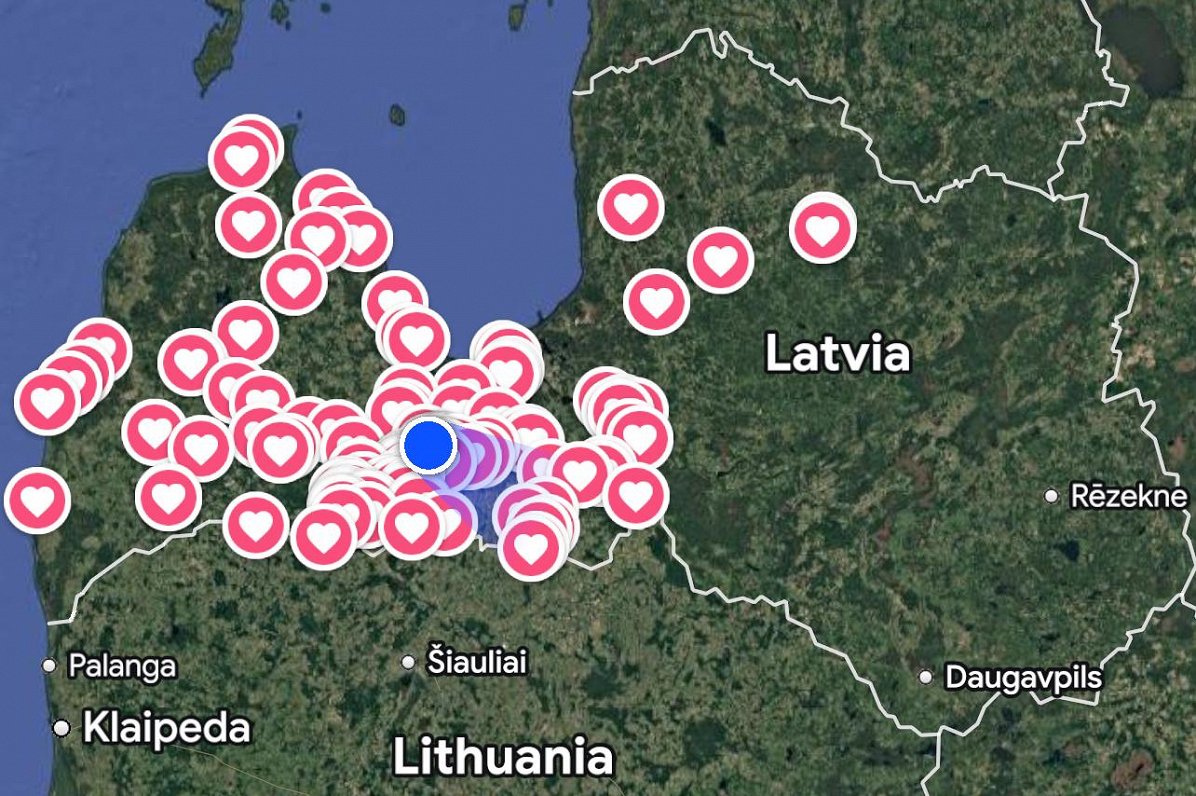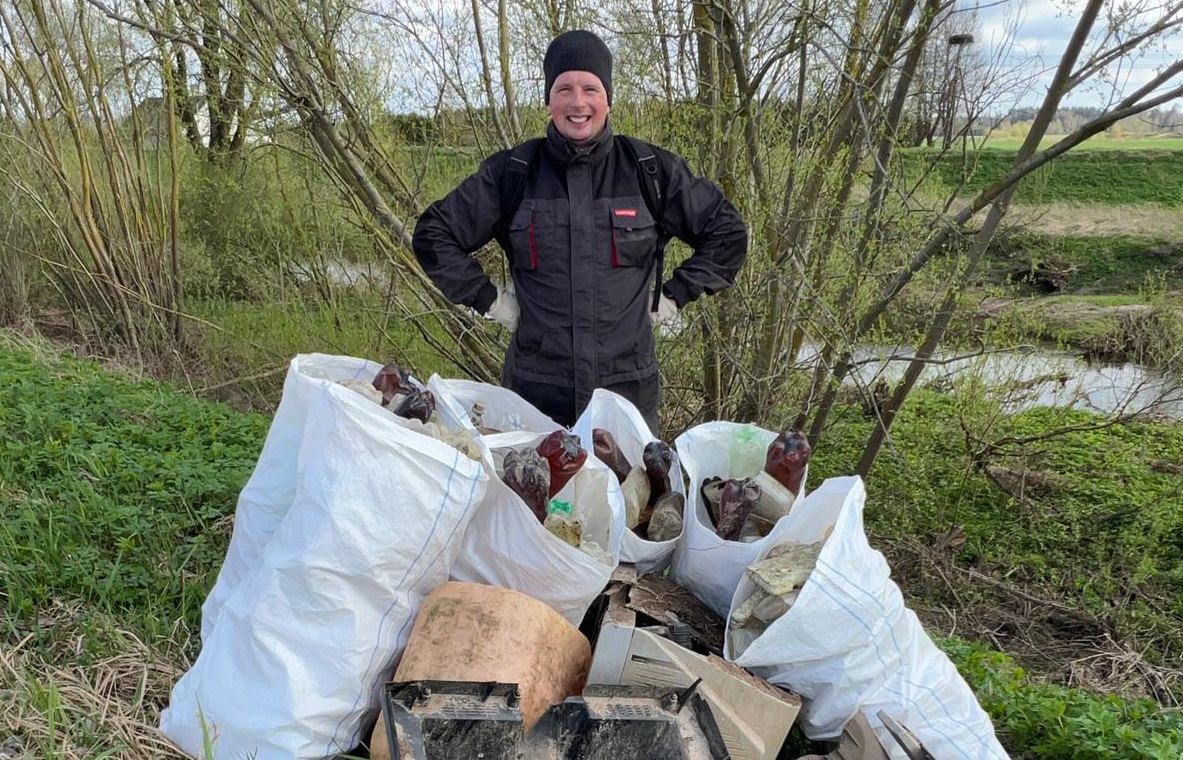Māris Strautnieks is a young man who works for the State Fire and Rescue Service (VUGD), but in his free time he has been cleaning up not only Līvbērze parish, where he lives, but also many other places in Latvia for five years.
This year alone, Māris has already cleaned up 167 places. What motivates him to do this, and what does Māris think about those who pollute nature, asks Latvian Radio.
Māris likes sports, going on long hikes and cycling, but now he does them less, because a large part of his free time is taken up by collecting rubbish both in his immediate vicinity and in other places in Latvia. The desire to clean up the environment arose in early childhood.
“Even as a child, when I saw how dirty the roadsides and bus stops were while walking or going to the bus stop, I always had the desire to clean up, but I only got around to actually doing it five years ago, because before that, well, there really wasn’t a place to put it, and there were also studies and a very busy everyday life,” says Māris.
The last straw that finally made his start cleaning up was the diligence of a neighbor.
“I was riding my bike home from the store and I saw a young mother living next door pushing a stroller with one hand and picking up trash with the other and putting it in a huge bag, and I thought – no, this is the moment when I have to start, I’m a man, I have more strength,” admits Māris.
The young mother had been cleaning up the neighborhood where she had been walking with her baby, and Māris had decided to do the same, but later expanded his field of activity.

Photo: Privātais arhīvs
He adds that before he started cleaning the roadsides, he contacted the municipal police and the parish administration to receive, as he puts it, the “green light” for such activities. The parish administration also provided bags to put the collected waste in.
“I filled up those 10 bags so quickly and hadn’t walked that far. Then imagine how much trash there was along the roadsides, in the forests. And I’ve cleaned up, in a sense, up to Dorupe, Šķibe, Bērze. I’ve cleaned up the banks of the Bērze River, and it’s a 10-kilometer stretch. But I’ve always returned to the already cleaned-up places, where people have littered again, and it’s, as you might say, a never-ending story. You might think that there’s no point in doing something like that… But I think differently, I’m setting an example, so that a carpet of garbage doesn’t accumulate in piles there.”
Sometimes Māris gets angry at those who pollute nature. “I had also finished cleaning up the riverbank, the Bērze Riverbank. The next day I looked and saw that new tires had been thrown there again… It’s sad, because a lot of work has been put in and everyone knows it, especially in the parish, but many people have the opinion – well, you know what, Strautnieks will pick it up. But that’s not a cool and positive attitude.”
He thinks that litterers behave this way out of indifference and laziness, because after relaxing in nature they don’t want to carry their trash back to their car. On the other hand, some people express their aggressive nature by throwing their trash wherever they want.
Being an active person, Māris travels a lot around Latvia and also collects waste during these trips.
“I travel around Latvia, see some beautiful places, and they are always littered, and I always have some bags with me, and then I clean up these places and mark on the map where I have been and which places I have cleaned up.”
It is rare, but it does happen that a bag is not needed because there is no waste. However, usually the situation is different.

Photo: Privātais arhīvs
“There are those parking lots that are near natural objects or the same natural objects, the paths are littered with standard waste: bottles, coffee cups and other types of packaging. Well, the saddest thing is to see construction debris thrown somewhere, tires dumped,” admits Māris.
Māris does not collect construction debris and tires, but posts information about his finds on social media, and then it happens that someone else collects them and, for example, takes them for recycling.
Since the introduction of a deposit fee for plastic bottles, they are less often found in nature. However, they are still found now. Māris returns them, and donates the recovered deposit money to a children’s charity.
When asked if there were any interesting finds among the trash, Māris reveals that he once found a wartime helmet and two five-euro bills.
Māris mostly goes alone on his nature cleanup expeditions, but sometimes like-minded people join him.
“Of course, there are also people who have donated gloves and bags. There was this case: I was cleaning up the riverbank. They brought me food from the village so I could eat something tasty, because they know I work there,” says Māris.
Māris has not counted the bags of garbage he has collected over the years, but he admits that he has invested a lot of work and a lot of his free time in cleaning up the environment. Māris regularly talks about his achievements on social media, which has gained him some recognition, as well as motivated others not to litter their surroundings and to clean them up.
“And people from all parts of the world, from countries, write to me that they have also gone with their families, cleaned up some beautiful places close to them, and I have also motivated them. It makes me very happy,” admits Māris.
Regarding the purpose of his work, Māris says:
“Maybe to teach society something, to do some good work. Maybe this path will lead me somewhere. Where? I don’t know. But I think that everything I do has results and success. That’s how I paint my everyday life: it’s messy, but after me it’s beautiful and tidy. I’m happy and satisfied with that.”
